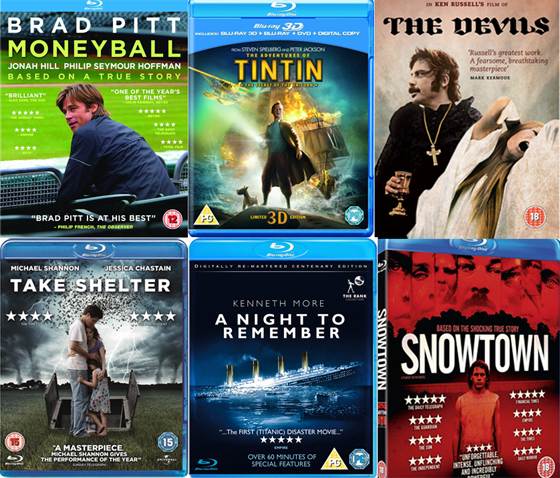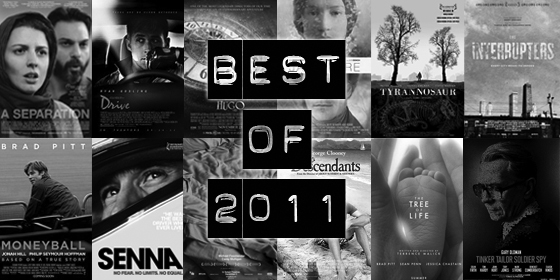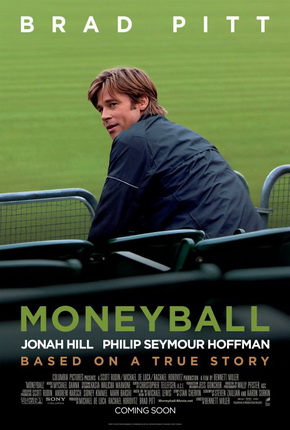DVD & BLU-RAY PICKS
Moneyball (Sony Pictures Home Ent.): Brad Pitt is outstanding as Oakland A’s general manager Billy Beane in this adaptation of Michael Lewis’ book, which revolutionised US sport. Directed by Bennett Miller, it co-stars Jonah Hill and Philip Seymour Hoffman. [Available on Blu-ray or DVD from Amazon] [Read our full review here]
The Adventures of Tintin: Secret of the Unicorn (Paramount Home Entertainment): Animated version of Herge’s famous character which realises the first three books with motion capture animation. Directed by Steven Spielberg, it features the voices of Jamie Bell, Andy Serkis and Daniel Craig. [Available on Blu-ray or DVD from Amazon] [Read our full review here]
The Devils (BFI Video): Vintage 1971 horror is finally released on DVD and is based partially on the Aldous Huxley book The Devils of Loudun and the The Devils by John Whiting. Directed by Ken Russell, it stars Oliver Reed and Vanessa Redgrave, it was banned in several countries and censorship problems resulted in long delays before it was available on home video. [Available on DVD from Amazon]
Take Shelter (Universal Pictures): Highly accomplished second film from director Jeff Nichols about a man (Michael Shannon) plagued by a series of apocalyptic visions questions and facing the dilemma as whether to shelter his family from a coming storm. Co-starring Jessica Chastain and Kathy Baker, it features one of the best endings in years. [Buy on Blu-ray or DVD from Amazon UK]
A Night to Remember (ITV DVD): A 1958 adaptation of Walter Lord‘s book recounting the final night of the RMS Titanic, adapted by Eric Ambler, directed by Roy Ward Baker. Long before James Cameron recreated the famous boat in the era of digital era with his 1997 blockbuster, this film used old school techniques to accurately create the sets, even using Titanic fourth officer Joseph Boxhall and ex-Cunard Commodore Harry Grattidge as technical advisors. [Buy it on Blu-ray or DVD from Amazon UK]
Snowtown (Revolver Entertainment): Grim but brilliantly made Australian drama about the notorious Snowtown killings. Directed by Justin Kurzel and written by Shaun Grant, it stars Daniel Henshall as John Bunting and Lucas Pittaway as James Vlassakis. [Buy it Blu-ray or DVD from Amazon UK]
Get Shorty (MGM Home Entertainment): Classy 1995 adaptation of Elmore Leonard’s novel about a loan shark (John Travolta) who travels to Hollywood were he encounters various characters played by Gene Hackman, Rene Russo and Danny DeVito (as a ‘two-time Academy nominee’ actor Martin Weir). Directed with a shrewd wit by Barry Sonnenfeld, who was once a DP for the Coen Brothers. [Buy it on DVD and Blu-ray from Amazon UK]
Weekend (Peccadillo Pictures): This Nottingham-set romance about two people who meet and chat over the course of 24 hours was one of the low-budget indie breakthroughs of 2011. Directed by Andrew Haigh, it stars Tom Cullen and Chris New, featuring cinematography by Urszula Pontikos. [Buy it on Blu-ray and DVD from Amazon UK]
ALSO OUT
1911 Revolution (Showbox Media Group) [Blu-ray / Ultimate Edition]
A Horrible Way to Die (Anchor Bay Entertainment UK) [Blu-ray / Normal]
American Pie (Universal Pictures) [Blu-ray / Normal]
American Pie 2 – Unseen (Universal Pictures) [Blu-ray / Normal]
American Pie: The Threesome (Universal Pictures) [Blu-ray / Box Set with Digital Copy]
American Pie: The Wedding Recut (Universal Pictures) [Blu-ray / Normal]
City of Men (Miramax) [Blu-ray / Normal]
Kalifornia (MGM Home Entertainment) [Blu-ray / Normal]
Machine Gun Preacher (Lionsgate UK) [Blu-ray / Normal]
One More – A Definitive History of UK Clubbing 1988-2008 (Odeon Entertainment) [Blu-ray / Normal]
Our House (Miramax) [Blu-ray / Normal]
Resistance (Metrodome Distribution) [Blu-ray / Normal]
Smoke (Miramax) [Blu-ray / Normal]
Spaceballs (MGM Home Entertainment) [Blu-ray / Normal]
The Crossing Guard (Miramax) [Blu-ray / Normal]
Tower Heist (Universal Pictures) [Blu-ray / Normal]
Trespass (Lionsgate UK) [Blu-ray / Normal]
> Recent DVD & Blu-ray picks
> The Best DVD and Blu-ray releases of 2011




